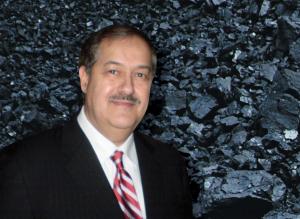America's Coal Boss on Trial

Court has just broken for 20 minutes and I’m in the men’s room standing next to one of Don Blankenship’s lawyers. In an awkward sort of way, we introduce ourselves but wait until we are at the sink to shake hands. Both of us are smiling and joking – an odd sense of levity at a time when a man’s life is on the line, or as much as 30 years.
Mr. Blankenship, of course, is the former chief executive of Massey Energy who is now facing 4-felony counts tied to an April 2010 mining accident in which 29 miners died in a tragic underground explosion. Federal prosecutors are alleging he deliberately tried to subvert mine safety regulations while misleading regulators and shareholders. He denies those charges, saying that his job was to manage a $6 billion enterprise – not the individual mines in question.
Re-entering the courtroom and before the judge and jury were seated, the lead prosecutor in the case is standing all by himself. If the defense lawyer is a bit eccentric – and extremely personable – then the prosecutor seems like a scholarly nerd. In fact, the whole prosecution team looks like they're 10 years out of Harvard Law, although I’m told Steve Ruby is a Washington & Lee and Duke University guy.
“I’m Ken Silverstein, Steve. I just want to introduce myself to you.”
“Nice to meet you, Ken,” Mr. Ruby said. “Ever seen a criminal trial?” he asked, with his eyes firmly locked into my own.
“Well, no,” now that you mention it, although I have on TV. (It’s not the same.)
At this point, I’m awestruck on a number of levels: For starters, this a mega-criminal trial, with Mr. Blankenship being just one of a handful of chief executives to face prosecution and serious prison time: Think Jeff Skilling of Enron, Martha Stewart of MS Living, Dennis Kozlowski of Tyco International and Bernie Ebbers of WorldCom.
I’m also taken aback because not just the lawyers but also the accused are walking freely in the common space where anyone – including a reporter like me – can just approach and strike up a conversation. (I knew better than to make small talk with Don Blankenship, although I thought about it.)
And, by all standards, this trial has huge implications – not just for Mr. Blankenship and the miners’ families but also for corporate America. Will the high profile prosecution of a former chief executive of a publicly traded company for allegedly ignoring mine safety regulations lead to more corporate diligence with respect to workplace safety? Or will it drive such internal policymaking to an opaque level?
As I’m thinking all this, Mr. Ruby is chatting with me and he is genuinely trying to put me at ease, all while giving me his undivided attention. It is as though we are at a backyard barbecue.
Finally, I just ask, “Don’t you feel like you have the weight of the world on your shoulders?” (Mind you, whatever Ruby is feeling, you can multiply that by 100 to try and figure out what Blankenship must be going through.)
“You can’t look it at that way,” Mr. Ruby said. Both his prosecution team and that of the defense have put in untold hours on this case for the last several years. They have interviewed countless witnesses and done their homework. They have prepared. And now it’s do-or-die. “You just never know what the jury will do,” which is something every lawyer says about every case – at least when you see them on TV.
But, looking into his eyes, I got it. I could see and feel that he meant it.
Just as I felt that emotional jolt, the bailiff’s voice bellows out that the judge and jury are returning to their respective positions. And with that, Mr. Ruby puts on his game face and I get out my reporter’s notebook.
Suddenly, the judge, jurors and spectators were riveted to Nixon-like tapes – the ones that Mr. Blankenship had secretly recorded between himself and the people who called him on the telephone. (Now, I don’t know if he tape recorded every call or just ones he thought he had to tape. I say this because I interviewed him about 10 years ago and now think my call to him may have been taped. That’s fine, because I didn’t misquote him – and if I had done so, he would have had the tape to prove it!)
He speaks in this low, slow tone. I’ll never forget it. The voice on those tapes was the same one I had a conversation with about mountaintop mining. However, these recordings – at least the ones played Friday – were about his compensation.
While I probably screwed up parts of my untaped conversation with Mr. Ruby – I think he will give me a pass – I’ll just paraphrase Mr. Blankenship: The former coal company chief executive said that he had built Massey into a $6 billion enterprise and that the board was bitching about having to pay him $12 million a year, and even then, it was coming mostly in stocks and stock options, or the right to buy stock at some point in the future at an agreed upon price.
Speaking just for me, he didn’t say anything an executive compensation expert had not said before. But I cover business and economics, and I get it. But will the jury?
The miners’ families in the courtroom didn’t seem to be understanding.
What the defense needs to do is to give an explanation to jurors as to just how corporate boards derive CEO pay – a jury who is filled with fair-minded people, although not multi-millionaires. Look, CEO compensation, generally, is out-of-whack with that of the rank-and-file. But I don’t think that his $12 million pay package relative to his company’s $6 billion valuation is perverse.
I’m not sure where the prosecution is taking this line of argument and after the hearing, I ran into a lawyer friend who said he was surprised the judge allowed that into evidence. It seems to me that they want to portray the defendant as heartless – someone too cheap to improve safety measures – but not so cheap that he won’t ask for more money for himself. I don’t think you can make that leap, quite honestly, but the prosecution is still making its case.
And I’ll return with further dispatches from the federal courthouse where the trial is taking place. If I can leave with you one thought for now, it’s that the courtroom is not this staid environment; rather, it is all too human – where I, a policy and economics reporter, could see and approach not just the lawyers presenting the case but also the victims’ families and the defendant himself.
Ken Silverstein is Editor-in-Chief of Public Utilities Fortnightly. Contact him at ksilverstein@fortnightly.com.
Lead image By Brianhayden1980 (Own work) [CC BY-SA 3.0 (http://creativecommons.org/licenses/by-sa/3.0)], via Wikimedia Commons



